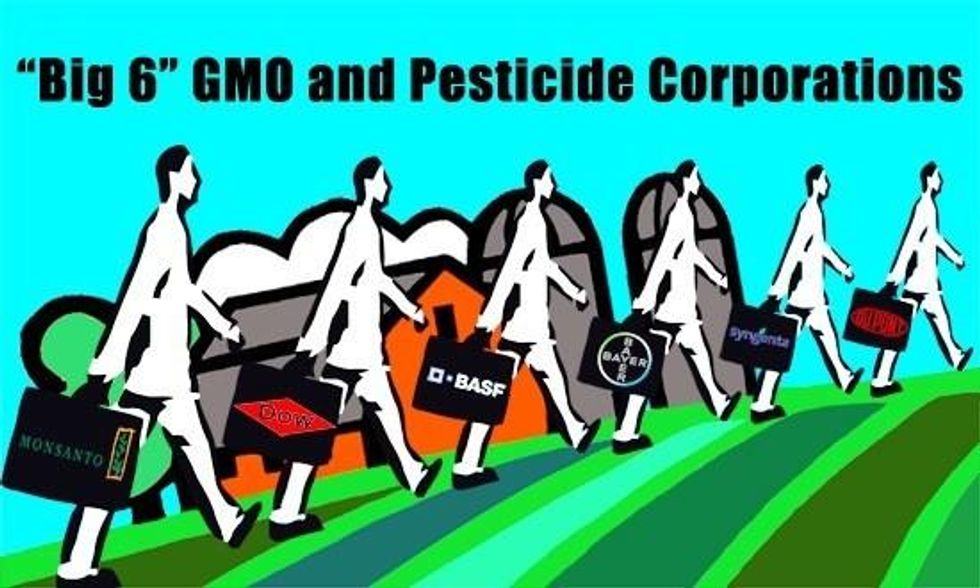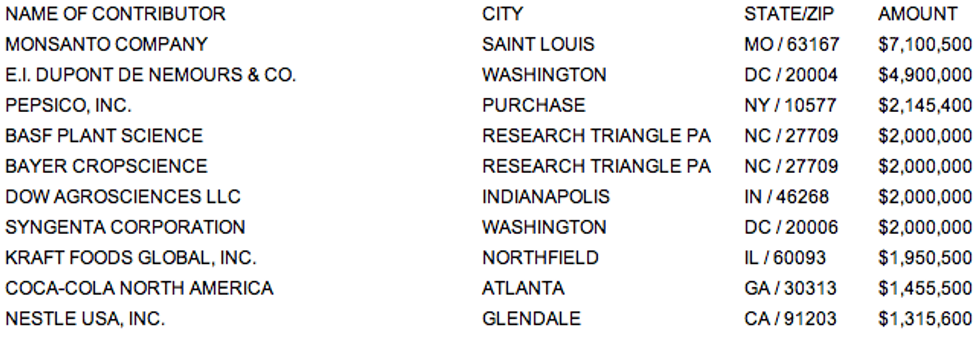Big Ag Ad Blitz Puts GMO Labeling in Jeopardy
California GMO Labeling Supporters Confront $34 Million Opposition and 13-Point Poll Slide

But in the two weeks following that poll, support dropped to 48 percent, according to a poll done by Pepperdine University School of Public Policy and the California Business Roundtable.
What explains the 13 point slide?
Multi-Million Dollar Ad Blitz Changes Minds
Between one poll and the next, voters saw the start of what the Los Angeles Times called a "major television advertising blitz by opponents aimed at changing voters' minds on the issue."
How big of an advertising blitz? $41 million in campaign contributions have been made to the "No on 37" campaign, according to the Los Angeles Times. The campaign paid Winner & Mandabach Campaigns, a political campaign management and advertising firm specializing solely in ballot measures, $14.7 million for "TV or cable airtime and production costs" in September.
Mark Bittman writes in a New York Times op-ed, "By some accounts the 'no' advocates are spending $1 million a day."
Follow the Money: "Big 6" GMO Companies Buy Big Ads
Among the campaign's largest funders are the "Big 6" GMO and pesticide corporations: BASF, Bayer, Dupont, Dow Chemical Company, Syngenta, and Monsanto (see the chart below this article). These six corporations dominate the world's seed, pesticide and genetic engineering (GE) industries. Collectively they have contributed more than $20 million to oppose the labeling measure.
The most effective ad run by the opposition campaign, according to "Yes on 37" spokesperson Stacy Malkan, features Henry I. Miller telling voters that Prop 37 "doesn't make sense." It misleads voters by spinning the law's logical labeling exemptions into "arbitrary" "special interest" loopholes that allegedly result in an "illogical" and "ill-conceived" law.
For instance, the ad discusses exemptions for animal products, but currently there are no genetically modified cows, pigs, or chickens on the market.
According to the Earth Island Journal, spinning the law's exemptions into a major issue makes "a snazzy sound bite, . . . no doubt informed by the No campaign's polling and focus group findings that show this is a wedge issue. But it's a strawman argument and fundamentally misleading. The article points out "the holes in the loophole argument" one by one.
Who is Henry Miller?
The ad originally listed campaign spokesperson Miller as "M.D., Stanford" and showed Stanford University buildings in the background. The campaign had to pull that version off the air at the request of Stanford University and re-do it because "the Stanford ID on the screen appeared to violate the university's policy against use of the Stanford name by consultants," according to the Los Angeles Times.
Miller is a senior research fellow at the Hoover Institution, a conservative think tank housed on the Stanford campus. Prior to joining Hoover, Miller worked for 15 years at the U.S. Food and Drug Administration (FDA), where he was an outspoken advocate of agricultural biotechnology, including GMOs. Miller was the founding director of the FDA Office of Biotechnology, from 1989-1994.
What Miller is most notorious for are his unusual public positions. In 2003, Miller penned an op-ed for the New York Times defending DDT and arguing for its resurrection. This prompted a U.S. Centers for Disease Control and Prevention (CDC) response pointing out the estimated "increase in infant deaths that might result from DDT spraying."
Miller was also a founding member scientist of The Advancement of Sound Science Coalition, a now-defunct, tobacco industry-funded public relations front group run by the APCO Worldwide PR firm that worked to discredit the links between cigarettes and cancer.
Perhaps most outrageously, Miller wrote in a 2011 op-ed for Forbes that some of those exposed to radiation after the damage to the Fukushima Daiichi nuclear power plant "could have actually benefitted from it."
So it is unsurprising that Miller penned a Forbes op-ed on GMO labeling this week suggesting that it is the supporters of GMO labeling who are engaged in "no-holds-barred advocacy . . . to disparage farming methods and promulgate fraudulent health claims about the foods we eat."
Behind the Money is the Right to Know
In these big dollar proposition campaigns, voters in California are often subject to a great deal of misinformation. As CMD has reported, a proposition on the California ballot in June dropped 17 points in the polls and was defeated after a $47 million misleading ad campaign by the tobacco industry.
On election day, voters in California are challenged to sift the wheat from the chaff to decide if they want to join 61 nations in enjoying the right to know if their food contains GMOs.
"No on 37" Campaign Funding

An Urgent Message From Our Co-Founder
Dear Common Dreams reader, The U.S. is on a fast track to authoritarianism like nothing I've ever seen. Meanwhile, corporate news outlets are utterly capitulating to Trump, twisting their coverage to avoid drawing his ire while lining up to stuff cash in his pockets. That's why I believe that Common Dreams is doing the best and most consequential reporting that we've ever done. Our small but mighty team is a progressive reporting powerhouse, covering the news every day that the corporate media never will. Our mission has always been simple: To inform. To inspire. And to ignite change for the common good. Now here's the key piece that I want all our readers to understand: None of this would be possible without your financial support. That's not just some fundraising cliche. It's the absolute and literal truth. We don't accept corporate advertising and never will. We don't have a paywall because we don't think people should be blocked from critical news based on their ability to pay. Everything we do is funded by the donations of readers like you. Will you donate now to help power the nonprofit, independent reporting of Common Dreams? Thank you for being a vital member of our community. Together, we can keep independent journalism alive when it’s needed most. - Craig Brown, Co-founder |

But in the two weeks following that poll, support dropped to 48 percent, according to a poll done by Pepperdine University School of Public Policy and the California Business Roundtable.
What explains the 13 point slide?
Multi-Million Dollar Ad Blitz Changes Minds
Between one poll and the next, voters saw the start of what the Los Angeles Times called a "major television advertising blitz by opponents aimed at changing voters' minds on the issue."
How big of an advertising blitz? $41 million in campaign contributions have been made to the "No on 37" campaign, according to the Los Angeles Times. The campaign paid Winner & Mandabach Campaigns, a political campaign management and advertising firm specializing solely in ballot measures, $14.7 million for "TV or cable airtime and production costs" in September.
Mark Bittman writes in a New York Times op-ed, "By some accounts the 'no' advocates are spending $1 million a day."
Follow the Money: "Big 6" GMO Companies Buy Big Ads
Among the campaign's largest funders are the "Big 6" GMO and pesticide corporations: BASF, Bayer, Dupont, Dow Chemical Company, Syngenta, and Monsanto (see the chart below this article). These six corporations dominate the world's seed, pesticide and genetic engineering (GE) industries. Collectively they have contributed more than $20 million to oppose the labeling measure.
The most effective ad run by the opposition campaign, according to "Yes on 37" spokesperson Stacy Malkan, features Henry I. Miller telling voters that Prop 37 "doesn't make sense." It misleads voters by spinning the law's logical labeling exemptions into "arbitrary" "special interest" loopholes that allegedly result in an "illogical" and "ill-conceived" law.
For instance, the ad discusses exemptions for animal products, but currently there are no genetically modified cows, pigs, or chickens on the market.
According to the Earth Island Journal, spinning the law's exemptions into a major issue makes "a snazzy sound bite, . . . no doubt informed by the No campaign's polling and focus group findings that show this is a wedge issue. But it's a strawman argument and fundamentally misleading. The article points out "the holes in the loophole argument" one by one.
Who is Henry Miller?
The ad originally listed campaign spokesperson Miller as "M.D., Stanford" and showed Stanford University buildings in the background. The campaign had to pull that version off the air at the request of Stanford University and re-do it because "the Stanford ID on the screen appeared to violate the university's policy against use of the Stanford name by consultants," according to the Los Angeles Times.
Miller is a senior research fellow at the Hoover Institution, a conservative think tank housed on the Stanford campus. Prior to joining Hoover, Miller worked for 15 years at the U.S. Food and Drug Administration (FDA), where he was an outspoken advocate of agricultural biotechnology, including GMOs. Miller was the founding director of the FDA Office of Biotechnology, from 1989-1994.
What Miller is most notorious for are his unusual public positions. In 2003, Miller penned an op-ed for the New York Times defending DDT and arguing for its resurrection. This prompted a U.S. Centers for Disease Control and Prevention (CDC) response pointing out the estimated "increase in infant deaths that might result from DDT spraying."
Miller was also a founding member scientist of The Advancement of Sound Science Coalition, a now-defunct, tobacco industry-funded public relations front group run by the APCO Worldwide PR firm that worked to discredit the links between cigarettes and cancer.
Perhaps most outrageously, Miller wrote in a 2011 op-ed for Forbes that some of those exposed to radiation after the damage to the Fukushima Daiichi nuclear power plant "could have actually benefitted from it."
So it is unsurprising that Miller penned a Forbes op-ed on GMO labeling this week suggesting that it is the supporters of GMO labeling who are engaged in "no-holds-barred advocacy . . . to disparage farming methods and promulgate fraudulent health claims about the foods we eat."
Behind the Money is the Right to Know
In these big dollar proposition campaigns, voters in California are often subject to a great deal of misinformation. As CMD has reported, a proposition on the California ballot in June dropped 17 points in the polls and was defeated after a $47 million misleading ad campaign by the tobacco industry.
On election day, voters in California are challenged to sift the wheat from the chaff to decide if they want to join 61 nations in enjoying the right to know if their food contains GMOs.
"No on 37" Campaign Funding


But in the two weeks following that poll, support dropped to 48 percent, according to a poll done by Pepperdine University School of Public Policy and the California Business Roundtable.
What explains the 13 point slide?
Multi-Million Dollar Ad Blitz Changes Minds
Between one poll and the next, voters saw the start of what the Los Angeles Times called a "major television advertising blitz by opponents aimed at changing voters' minds on the issue."
How big of an advertising blitz? $41 million in campaign contributions have been made to the "No on 37" campaign, according to the Los Angeles Times. The campaign paid Winner & Mandabach Campaigns, a political campaign management and advertising firm specializing solely in ballot measures, $14.7 million for "TV or cable airtime and production costs" in September.
Mark Bittman writes in a New York Times op-ed, "By some accounts the 'no' advocates are spending $1 million a day."
Follow the Money: "Big 6" GMO Companies Buy Big Ads
Among the campaign's largest funders are the "Big 6" GMO and pesticide corporations: BASF, Bayer, Dupont, Dow Chemical Company, Syngenta, and Monsanto (see the chart below this article). These six corporations dominate the world's seed, pesticide and genetic engineering (GE) industries. Collectively they have contributed more than $20 million to oppose the labeling measure.
The most effective ad run by the opposition campaign, according to "Yes on 37" spokesperson Stacy Malkan, features Henry I. Miller telling voters that Prop 37 "doesn't make sense." It misleads voters by spinning the law's logical labeling exemptions into "arbitrary" "special interest" loopholes that allegedly result in an "illogical" and "ill-conceived" law.
For instance, the ad discusses exemptions for animal products, but currently there are no genetically modified cows, pigs, or chickens on the market.
According to the Earth Island Journal, spinning the law's exemptions into a major issue makes "a snazzy sound bite, . . . no doubt informed by the No campaign's polling and focus group findings that show this is a wedge issue. But it's a strawman argument and fundamentally misleading. The article points out "the holes in the loophole argument" one by one.
Who is Henry Miller?
The ad originally listed campaign spokesperson Miller as "M.D., Stanford" and showed Stanford University buildings in the background. The campaign had to pull that version off the air at the request of Stanford University and re-do it because "the Stanford ID on the screen appeared to violate the university's policy against use of the Stanford name by consultants," according to the Los Angeles Times.
Miller is a senior research fellow at the Hoover Institution, a conservative think tank housed on the Stanford campus. Prior to joining Hoover, Miller worked for 15 years at the U.S. Food and Drug Administration (FDA), where he was an outspoken advocate of agricultural biotechnology, including GMOs. Miller was the founding director of the FDA Office of Biotechnology, from 1989-1994.
What Miller is most notorious for are his unusual public positions. In 2003, Miller penned an op-ed for the New York Times defending DDT and arguing for its resurrection. This prompted a U.S. Centers for Disease Control and Prevention (CDC) response pointing out the estimated "increase in infant deaths that might result from DDT spraying."
Miller was also a founding member scientist of The Advancement of Sound Science Coalition, a now-defunct, tobacco industry-funded public relations front group run by the APCO Worldwide PR firm that worked to discredit the links between cigarettes and cancer.
Perhaps most outrageously, Miller wrote in a 2011 op-ed for Forbes that some of those exposed to radiation after the damage to the Fukushima Daiichi nuclear power plant "could have actually benefitted from it."
So it is unsurprising that Miller penned a Forbes op-ed on GMO labeling this week suggesting that it is the supporters of GMO labeling who are engaged in "no-holds-barred advocacy . . . to disparage farming methods and promulgate fraudulent health claims about the foods we eat."
Behind the Money is the Right to Know
In these big dollar proposition campaigns, voters in California are often subject to a great deal of misinformation. As CMD has reported, a proposition on the California ballot in June dropped 17 points in the polls and was defeated after a $47 million misleading ad campaign by the tobacco industry.
On election day, voters in California are challenged to sift the wheat from the chaff to decide if they want to join 61 nations in enjoying the right to know if their food contains GMOs.
"No on 37" Campaign Funding


